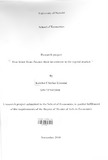| dc.description.abstract | This paper primarily investigates the role played by both internal and external finance in investment decisions of Kenyan listed firms. The objectives were to find out the sources of funds for listed firms, and whether cash flows and debt influence these firms' investment decisions. We used firm-level panel data for the period 2000-2008. Tests were based on fundamentals q investment equations in which cash flow and debt were added as explanatory variables. All these variables were normalized by beginning period capital stock. We demarcate between two types of firms, namely: (a) small firms (with capitalization of less than sh. 10 billion); (b) large firms (whose market capitalization> sh. 10 billion).Two hypotheses were tested. First, whether there is a relationship between cash flows and firm investment. Secondly, whether there is a relationship between firm level debt and investment.
The results reveal a significant positive relationship between debt and investment levels in both types of firms. Interestingly, we found a negative but insignificant relationship between cash flows and investment in both types of firms. Whereas coefficients of q are positive in both firms, q is insignificant in large firms. We conclude that corporate investment of firms in both groups does not respond to market fundamentals and liquidity position. The findings support corporate life cycle hypothesis where as firms become mature past investments generate higher cash flows, making present investment rates to slow down, and become less attractive. Hence the negative empirical relationship between investment and cash flows.
A favourable legal and institutional framework that ensures creditors' protection and proper functioning of commercial banks should be enforced. This is because Kenya needs an appropriate level of interest rate established by monetary and fiscal policy to enable corporate investment. Lastly, the Kenyan debt market should be enhanced further to improve access of firms to cheap credit, and expand their options. | en_US |

